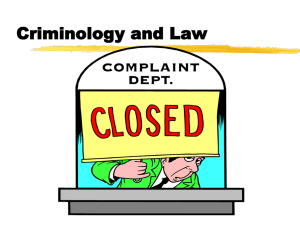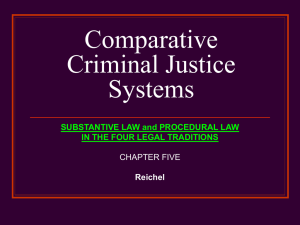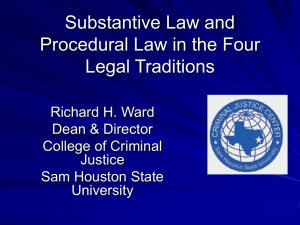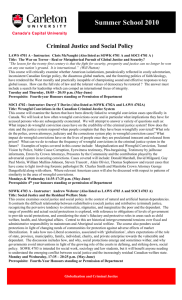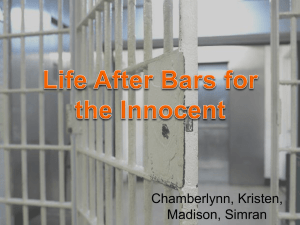PRESENTATIONS Jacqueline Hodgson
advertisement
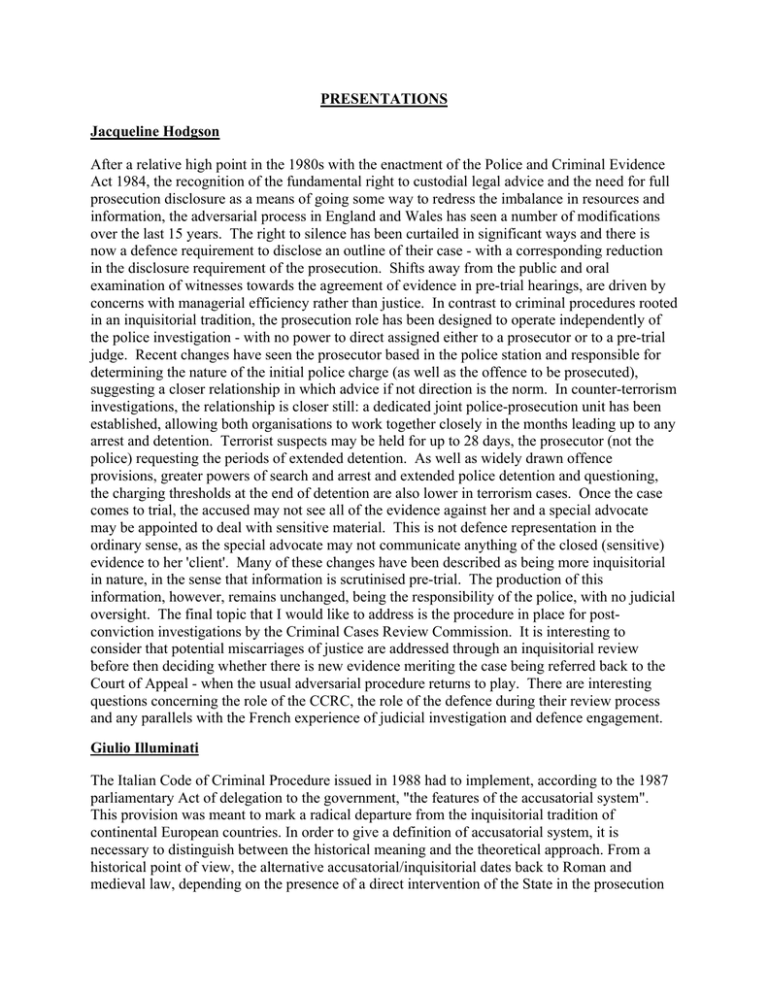
PRESENTATIONS Jacqueline Hodgson After a relative high point in the 1980s with the enactment of the Police and Criminal Evidence Act 1984, the recognition of the fundamental right to custodial legal advice and the need for full prosecution disclosure as a means of going some way to redress the imbalance in resources and information, the adversarial process in England and Wales has seen a number of modifications over the last 15 years. The right to silence has been curtailed in significant ways and there is now a defence requirement to disclose an outline of their case - with a corresponding reduction in the disclosure requirement of the prosecution. Shifts away from the public and oral examination of witnesses towards the agreement of evidence in pre-trial hearings, are driven by concerns with managerial efficiency rather than justice. In contrast to criminal procedures rooted in an inquisitorial tradition, the prosecution role has been designed to operate independently of the police investigation - with no power to direct assigned either to a prosecutor or to a pre-trial judge. Recent changes have seen the prosecutor based in the police station and responsible for determining the nature of the initial police charge (as well as the offence to be prosecuted), suggesting a closer relationship in which advice if not direction is the norm. In counter-terrorism investigations, the relationship is closer still: a dedicated joint police-prosecution unit has been established, allowing both organisations to work together closely in the months leading up to any arrest and detention. Terrorist suspects may be held for up to 28 days, the prosecutor (not the police) requesting the periods of extended detention. As well as widely drawn offence provisions, greater powers of search and arrest and extended police detention and questioning, the charging thresholds at the end of detention are also lower in terrorism cases. Once the case comes to trial, the accused may not see all of the evidence against her and a special advocate may be appointed to deal with sensitive material. This is not defence representation in the ordinary sense, as the special advocate may not communicate anything of the closed (sensitive) evidence to her 'client'. Many of these changes have been described as being more inquisitorial in nature, in the sense that information is scrutinised pre-trial. The production of this information, however, remains unchanged, being the responsibility of the police, with no judicial oversight. The final topic that I would like to address is the procedure in place for postconviction investigations by the Criminal Cases Review Commission. It is interesting to consider that potential miscarriages of justice are addressed through an inquisitorial review before then deciding whether there is new evidence meriting the case being referred back to the Court of Appeal - when the usual adversarial procedure returns to play. There are interesting questions concerning the role of the CCRC, the role of the defence during their review process and any parallels with the French experience of judicial investigation and defence engagement. Giulio Illuminati The Italian Code of Criminal Procedure issued in 1988 had to implement, according to the 1987 parliamentary Act of delegation to the government, "the features of the accusatorial system". This provision was meant to mark a radical departure from the inquisitorial tradition of continental European countries. In order to give a definition of accusatorial system, it is necessary to distinguish between the historical meaning and the theoretical approach. From a historical point of view, the alternative accusatorial/inquisitorial dates back to Roman and medieval law, depending on the presence of a direct intervention of the State in the prosecution and on the powers of initiative of the judge in the proceeding. From a theoretical point of view, the paper assumes that the accusatorial model is characterized by the principle of confrontation on the evidence collected in a public trial. As a consequence, a strict separation of the investigating phase from the trial is required. In this meaning, an accusatorial system does not necessarily imply a full adversarial procedure. In particular, the Italian-style accusatorial process is well away from the Anglo-American adversary trial: taking into account, on the one hand, the principle of mandatory prosecution, on the other hand, the prevailing control of the judge over the assessment of the facts. In the Italian juridical culture the criminal process is not considered as much a means of settlement of conflicts, but rather a means of ascertainment of the truth. Richard Myers My paper will consider the inherent tensions between truth-finding as a function and a clientcentered ethic in the American adversarial system. I am interested in truth-defeating or truthobscuring mechanisms we have adopted for other purposes, such as the exclusionary rule and the various forms of evidentiary privilege, and how they undercut defense counsel's credibility with prosecutors, and as a result undercut counsel's power to act as an honest broker in a system where the vast majority of cases are resolved in a negotiated plea. I will suggest that the current system, perhaps for very valid reasons, serves the guilty far better than the innocent, because the defense bar has an institutional and often repeated reaction in favoring of mechanisms that increase its ability to control (or limit) access to true and potentially damaging information. Some differences in the balance on the prosecution side, such as open-file discovery and constitutional obligations to reveal exculpatory information, somewhat undercut similar concerns related to the prosecutor. However, truth-obscuring mechanisms are in place on the prosecution side as well. I am really interested to hear about how these tensions are resolved in other systems. Theresa Newman and James Coleman The U.S. criminal justice system relies on the adversarial nature of the established trial process to lead to the development of the "facts" of a case and, ultimately, to a just result. Regrettably, that process is now known to produce an intolerably high number of incorrect results, as evidenced by the number of exonerations over the past decade or so. As a result, the adversarial system is now being modified -- or modifications are being proposed -- to protect the innocent and otherwise advance justice. We will identify some of the problems with the existing system that lead to the conviction of the innocent and discuss some of the proposed reforms, ranging from slight modifications to the rules of ethics governing lawyers' conduct in the adversarial system to the creation of new fora for adjudicating claims of innocence. Kent Roach My paper will examine the effects of the recent discovery of wide-spread wrongful convictions on the future of the adversary system. The first part of the paper will assess whether the common causes of wrongful convictions reflect a failure of the adversarial system. For example, the ability to cross-examine adverse witnesses is commonly seen as important safeguard of the adversarial system, but it may not be effective with respect to witnesses who have made honest mistakes about the identity of a perpetrator of a crime. Similarly, party presentation of expert evidence may have an insufficient appreciation of social interests in the discovery of the truth. The second part of the paper will examine the extent to which remedies for wrongful convictions can be found in 1) improvements of the adversarial system and/or 2) through increased use of more state-based and court-based inquisitorial features. The former adversarial remedies include measures such as better funding for defence counsel and the use of challenge functions within policing and prosecutorial agencies to counter tunnel vision. The latter inquisitorial remedies include an increased gate keeping role for judges with respect to expert scientific evidence, broader fact-based appeals, and the use of state-based commissions to investigate claims of wrongful convictions. I will draw mainly on examples of the wrongful conviction debate in Canada including recommendations made by three recent Canadian commissions of inquiry that examined specific wrongful convictions and made recommendations about various forms of scientific evidence, determinations of innocence and the investigation of wrongful convictions. I will also make reference to the growing literature on wrongful convictions in continental systems, most specifically in Netherlands and France. I will examine the hypothesis that present thinking about wrongful convictions reveals deep ambivalence about the ability of both adversary and inquisitorial features of Anglo-American systems to discover the truth. I will also examine the extent to which adversarial or inquisitorial systems may be resistant to adopting features of the other system as a means to prevent and remedy wrongful convictions. Ron Wright Since the early 1990s, a number of Latin American countries have experimented with movements toward adversarial systems of criminal justice. These experiments have included an emphasis on oral trial proceedings, de-emphasis of judicial participation in the investigation process, increased roles for defense attorneys and prosecutors, the availability of abbreviated proceedings, and negotiated punishments such as probation and diversion. Some of the most recent movement in this direction has happened in Mexico. My article will explore the sources of the reform efforts in Mexico and the institutional habits that will project these reform ideas onto the landscape of daily criminal justice in Mexico. My interest throughout will be the forces that will make this movement different in Mexico than the reform efforts that have played out elsewhere in Latin America.
